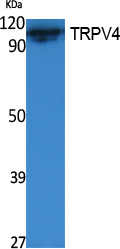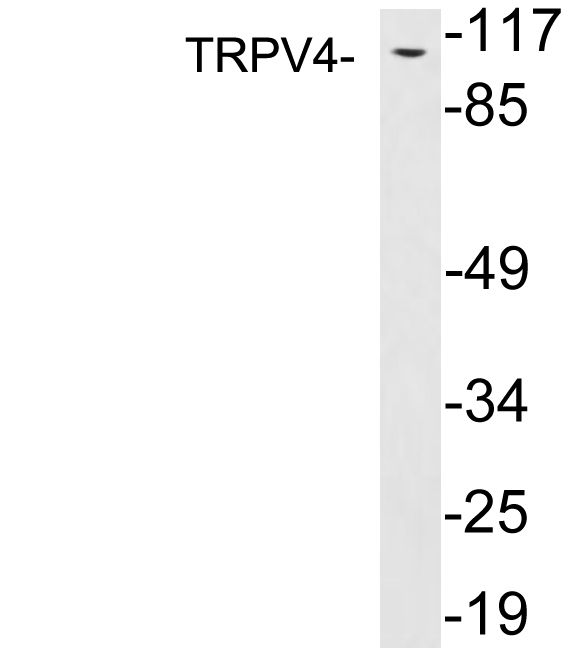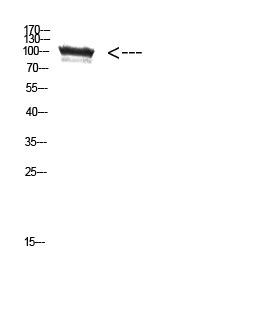TRPV4 Polyclonal Antibody
- Catalog No.:YT5040
- Applications:WB;ELISA
- Reactivity:Human;Mouse;Rat
- Target:
- TRPV4
- Fields:
- >>Cellular senescence;>>Inflammatory mediator regulation of TRP channels;>>Fluid shear stress and atherosclerosis
- Gene Name:
- TRPV4
- Protein Name:
- Transient receptor potential cation channel subfamily V member 4
- Human Gene Id:
- 59341
- Human Swiss Prot No:
- Q9HBA0
- Mouse Gene Id:
- 63873
- Mouse Swiss Prot No:
- Q9EPK8
- Rat Gene Id:
- 66026
- Rat Swiss Prot No:
- Q9ERZ8
- Immunogen:
- The antiserum was produced against synthesized peptide derived from human TRPV4. AA range:417-466
- Specificity:
- TRPV4 Polyclonal Antibody detects endogenous levels of TRPV4 protein.
- Formulation:
- Liquid in PBS containing 50% glycerol, 0.5% BSA and 0.02% sodium azide.
- Source:
- Polyclonal, Rabbit,IgG
- Dilution:
- WB 1:500 - 1:2000. ELISA: 1:20000. Not yet tested in other applications.
- Purification:
- The antibody was affinity-purified from rabbit antiserum by affinity-chromatography using epitope-specific immunogen.
- Concentration:
- 1 mg/ml
- Storage Stability:
- -15°C to -25°C/1 year(Do not lower than -25°C)
- Other Name:
- TRPV4;VRL2;VROAC;Transient receptor potential cation channel subfamily V member 4;TrpV4;Osm-9-like TRP channel 4;OTRPC4;Transient receptor potential protein 12;TRP12;Vanilloid receptor-like channel 2;Vanilloid receptor-like protein 2;VRL-2;Vanilloid receptor-related osmotically-activated channel;VR-OAC
- Observed Band(KD):
- 98kD
- Background:
- transient receptor potential cation channel subfamily V member 4(TRPV4) Homo sapiens This gene encodes a member of the OSM9-like transient receptor potential channel (OTRPC) subfamily in the transient receptor potential (TRP) superfamily of ion channels. The encoded protein is a Ca2+-permeable, nonselective cation channel that is thought to be involved in the regulation of systemic osmotic pressure. Mutations in this gene are the cause of spondylometaphyseal and metatropic dysplasia and hereditary motor and sensory neuropathy type IIC. Multiple transcript variants encoding different isoforms have been found for this gene. [provided by RefSeq, Apr 2010],
- Function:
- disease:Defects in TRPV4 are the cause of brachyolmia type 3 [MIM:113500]; also called brachyrachia. The brachyolmias constitute a clinically and genetically heterogeneous group of skeletal dysplasias characterized by a short trunk, scoliosis and mild short stature. Type 3 brachyolmia is an autosomal dominant form with severe kyphoscoliosis and flattened, irregular cervical vertebrae.,function:Non-selective calcium permeant cation channel probably involved in osmotic sensitivity and mechanosensitivity. Activation by exposure to hypotonicity within the physiological range exhibits an outward rectification. Also activated by low pH, citrate and phorbol esters. Increase of intracellular Ca(2+) potentiates currents. Channel activity seems to be regulated by a calmodulin-dependent mechanism with a negative feedback mechanism.,similarity:Belongs to the transient receptor family. TrpV subfamily
- Subcellular Location:
- Cell membrane . Apical cell membrane ; Multi-pass membrane protein . Cell junction, adherens junction . Cell projection, cilium . Assembly of the putative homotetramer occurs primarily in the endoplasmic reticulum. .; [Isoform 1]: Cell membrane .; [Isoform 5]: Cell membrane .; [Isoform 2]: Endoplasmic reticulum .; [Isoform 4]: Endoplasmic reticulum .; [Isoform 6]: Endoplasmic reticulum .
- Expression:
- Found in the synoviocytes from patients with (RA) and without (CTR) rheumatoid arthritis (at protein level).
- June 19-2018
- WESTERN IMMUNOBLOTTING PROTOCOL
- June 19-2018
- IMMUNOHISTOCHEMISTRY-PARAFFIN PROTOCOL
- June 19-2018
- IMMUNOFLUORESCENCE PROTOCOL
- September 08-2020
- FLOW-CYTOMEYRT-PROTOCOL
- May 20-2022
- Cell-Based ELISA│解您多样本WB检测之困扰
- July 13-2018
- CELL-BASED-ELISA-PROTOCOL-FOR-ACETYL-PROTEIN
- July 13-2018
- CELL-BASED-ELISA-PROTOCOL-FOR-PHOSPHO-PROTEIN
- July 13-2018
- Antibody-FAQs
- Products Images

- Western Blot analysis of extracts from K562 cells, using TRPV4 Polyclonal Antibody. Secondary antibody(catalog#:RS0002) was diluted at 1:20000

- Western blot analysis of lysates from PC12 cells, using TRPV4 antibody.


